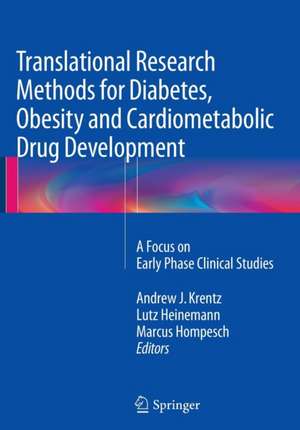Translational Research Methods for Diabetes, Obesity and Cardiometabolic Drug Development: A Focus on Early Phase Clinical Studies
Editat de Andrew J. Krentz, Lutz Heinemann, Marcus Hompeschen Limba Engleză Paperback – 22 sep 2016
Preț: 841.70 lei
Preț vechi: 886.00 lei
-5% Nou
Puncte Express: 1263
Preț estimativ în valută:
161.11€ • 175.06$ • 135.42£
161.11€ • 175.06$ • 135.42£
Carte tipărită la comandă
Livrare economică 21 aprilie-05 mai
Preluare comenzi: 021 569.72.76
Specificații
ISBN-13: 9781447170327
ISBN-10: 1447170326
Pagini: 312
Ilustrații: XII, 312 p. 76 illus., 39 illus. in color.
Dimensiuni: 178 x 254 x 17 mm
Greutate: 0.57 kg
Ediția:Softcover reprint of the original 1st ed. 2015
Editura: SPRINGER LONDON
Colecția Springer
Locul publicării:London, United Kingdom
ISBN-10: 1447170326
Pagini: 312
Ilustrații: XII, 312 p. 76 illus., 39 illus. in color.
Dimensiuni: 178 x 254 x 17 mm
Greutate: 0.57 kg
Ediția:Softcover reprint of the original 1st ed. 2015
Editura: SPRINGER LONDON
Colecția Springer
Locul publicării:London, United Kingdom
Cuprins
1. Review of physiology/pathophysiology.- 2. Methods for assessing insulin action in humans.- 3. Assessment of insulin secretion.- 4. Measurement of ectopic fat in liver and muscle using magnetic resonance spectroscopy.- 5. Isotopic tracers for the measurement of metabolic flux.- 6. Measuring food intake in clinical drug development.- 7. Measurement of energy expenditure.- 8. Assessment of body composition.- 9. Assessment of cardiovascular safety of new diabetes drugs.
Recenzii
“An important resource for researchers to orient themselves in the choice of correct study techniques, for both metabolic studies related to drug development and clinical studies. … it is also a great resource for experienced researchers in the field as a useful compendium of the major and emerging techniques already used in the study of the pathophysiology of metabolism, and as a valuable aid to researchers beginning studies in the field for choosing the most appropriate techniques for their purposes.” (Stefania Camastra, Pharmaceutical Medicine, Vol. 30, 2016)
Notă biografică
Andrew J Krentz, Senior Director of Scientific Services at the Profil Institute, is a clinical academic with more than three decades of experience in diabetes and cardiometabolic medicine. He holds a visiting chair at the Bedfordshire & Hertfordshire Postgraduate Medical School, University of Bedfordshire UK where he was Associate Professor before joining Profil. Prior to this he was a senior physician in internal medicine, diabetes & endocrinology at Southampton University Hospitals, UK. Lutz Heinemann, Senior Scientific Consultant at the Profil Institute, has acted as scientific advisor for Profil Institute since the company’s inception in 2004. He consults on the design of clinical trial protocols and in the publication of study results. He is also co-founder of Profil Institute for Metabolic Research in Neuss, Germany and led the company as CEO for 10 years until 2009. Prior to that, Prof. Dr. Heinemann spent 17 years performing diabetes-related clinical and experimental research at the Department of Metabolic Diseases and Nutrition, a World Health Organization Collaborating Center of Diabetes, at Heinrich-Heine University of Düsseldorf in Germany. Marcus Hompesch, President and Chief Executive Officer, Profil Institute, is an expert in the field of metabolic diseases, a licensed physician and entrepreneur. His experience in designing, performing and publishing clinical studies in metabolic diseases has been gained through over 18 years of work as clinician and clinical researcher. Dr. Hompesch established Profil Institute for Clinical Research in San Diego, CA in 2003.
Textul de pe ultima copertă
This book aims to aid the selection of the most appropriate techniques for use in early phase (1 and 2) clinical studies of new drugs for diabetes, obesity, and related cardiometabolic disease.
Clinical research methods for assessing the pharmacokinetics and pharmacodynamics of new diabetes drugs, e.g. the euglycaemic clamp technique, have become well-established in proof-of-mechanism studies; however, selection of the best techniques is by no means straightforward.
This book will aid the understanding of the need for new pharmacotherapies for type 1 diabetes, type 2 diabetes, and obesity and the molecular targets of drugs currently in development. Emerging technologies including the omics disciplines are considered together with practical and ethical issues of early phase clinical trials in subjects with cardiometabolic disorders.
Translational Research Methods for Diabetes, Obesity and Cardiometabolic Drug Development will be of interest to biomedical scientists, pharmacologists, academics involved in metabolic research and clinicians practicing in these specialties.
Clinical research methods for assessing the pharmacokinetics and pharmacodynamics of new diabetes drugs, e.g. the euglycaemic clamp technique, have become well-established in proof-of-mechanism studies; however, selection of the best techniques is by no means straightforward.
This book will aid the understanding of the need for new pharmacotherapies for type 1 diabetes, type 2 diabetes, and obesity and the molecular targets of drugs currently in development. Emerging technologies including the omics disciplines are considered together with practical and ethical issues of early phase clinical trials in subjects with cardiometabolic disorders.
Translational Research Methods for Diabetes, Obesity and Cardiometabolic Drug Development will be of interest to biomedical scientists, pharmacologists, academics involved in metabolic research and clinicians practicing in these specialties.
Caracteristici
Provides a background to aid the understanding of drug effects and non-drug treatment strategies on key biochemical-hormonal defects of obesity and type 2 diabetes Aids the selection of the most appropriate techniques for assessing insulin action, insulin secretion and body composition in humans? Provides practical examples to assist usage/applications, explanation and study analysis Perils and pitfalls are summarized for each technique
